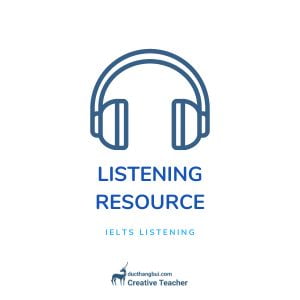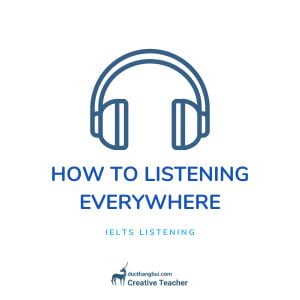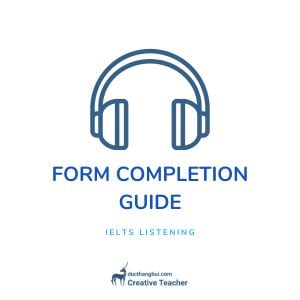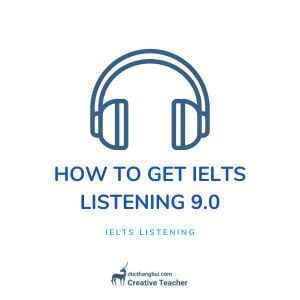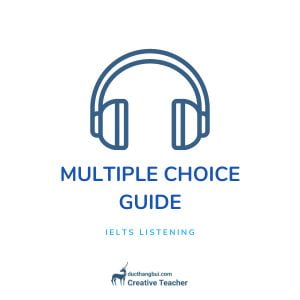Các bí quyết đơn giản sau đây sẽ giúp bạn cải thiện kĩ năng nghe tiếng Anh và IELTS Listening một cách nhanh chóng.
Nếu bạn đang gặp khó khăn về IELTS Listening, bạn có thể học chuỗi bài học Hướng dẫn IELTS Listening từ cơ bản tới nâng cao.
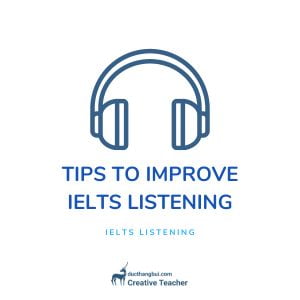
Dưới đây là 9 bí quyết giúp bạn cải thiện kỹ năng nghe tiếng Anh.
Các bí quyết này được trích từ Hot English Publishing nên mình tạm thời để nguyên tiếng Anh. Phần dịch các tips này ở bên dưới nhé.
Trước khi đọc tiếp bài học ở bên dưới, bạn có thể đăng ký để nhận email hàng tuần của tôi. Tôi sẽ gửi bạn những nội dung, tips, hướng dẫn, kinh nghiệm giúp bạn học tiếng Anh và IELTS hiệu quả nhất nhé. Có rất nhiều tài liệu và bài học độc quyền tôi chỉ gửi qua email này thôi đấy. (Nếu bạn đã đăng ký, vui lòng bỏ qua nhé. Rất xin lỗi đã làm phiền bạn)
1. Accept the facts
First of all, you need to accept the fact that you aren’t going to understand everything. Experts have shown that we only actually hear or fully understand about 40% of the words during a conversation… even in our own language.
2. Keep calm!
While you’re listening, the most important thing is to stay calm. You won’t understand everything so don’t let that upset you. The aim is to get a general idea of what the other person is saying. Never try to listen out for every word. Listen for the gist of the conversation – go for the main ideas.
3. Ask for help!
If you’re having problems during the conversation, ask the other to speak more slowly. Also, ask people the repeat things if you didn’t understand. Again, the speaker is trying to have a conversation and will do what they can to help you.
4. Don’t translate!
While you’re listening, don’t try to translate. If you do, you’ll start concentrating on translating and not on processing the information. And then you’ll lose track of the conversation.
5. Keywords!
The most important thing is to listen out for the key words – the important, stressed words. Basically, English is a stress-timed language. This means that when we speak, we focus on specific stressed words while quickly gliding over the rest. Those stressed words are usually nouns (“dog/table”), verbs (“sit/run”), adjectives (“beautiful/wonderful”) and adverbs (“quickly/slowly”). Most of the other words (determiners, auxilary verbs, pronouns, etc.) are weak sounds. The great thing is that you only really need to understand the key words in order to follow the conversation. For example, if you heard the following key words, “saw/film/cinema/last night”, you’d understand and that the other person is probably saying, “I saw a film at the cinema last night.”
6. Think “context”!
The other really important thing is to think about the context. If you know what the main topic is, you’ll be able to guess what the other are talking about. For example, if you know the topic is “the weather”, you can be sure that they’re going to mention things about the rain, the snow, the wind, the temperature… and so on.
7. Guess!
If you know what the context of the conversation is, you should be able to guess a lot of what the other person is saying… even if you don’t hear or understand all the words. The trick is to use your imagination, to guess and to follow your intuition. It isn’t an exact science, but it works!
8. Improve your pronunciation!
Finally, you need to learn about English pronunciation, and above all, connected speech. This occurs when sounds merge together to form new sounds – often when a consonant sound at the end of a word is followed by a vowel sound in the following word. For example, “She lived in New York” would be “She liv din New York” with connected speech. And we don’t usually say, “Look/out” (with separate sounds), we say, “Loo kout” (with the final consonant “k” combining with the vowel sound “ow” of the second word).
9. Practise!
So, what can you do to improve your listening skills? There are three main things:
– Listening to recordings that are specifically targeted at your level.
– Listen to native speaker conversations and recordings (from films, the news, TV series, songs, etc.) in order to develop your ear for the language.
– Listen to recorded material and read the tapescript at the same time so you can see how the words and sounds fit together.
LƯU Ý!
Cảm ơn bạn đã đọc bài viết này. Mình rất mong bạn dành vài giây để đọc thông tin này nhé.
Lớp học tiếng Anh mất gốc Online English Boost sắp khai giảng giúp bạn lấy lại tự tin trước khi học IELTS, hãy nhanh tay đăng ký nhé.
Nếu bạn đang học IELTS Writing nhưng mãi chưa viết được bài hoàn chỉnh hoặc mãi chưa tăng điểm. Đó là do bạn không có người hướng dẫn chi tiết và không được chữa bài, hãy đăng ký khóa học IELTS Online Writing 1-1 với đặc trưng là tất cả bài viết đều được chữa chi tiết nhiều lần bởi giáo viên và cựu giám khảo, đã giúp tăng 0.5 chấm trong 2 tuần.
Nếu bạn đang gặp khó khăn khi bắt đầu việc học IELTS 4 kỹ năng đừng tự mò mẫm nữa. Để tiết kiệm thời gian và chi phí, bạn có thể đăng ký ngay khóa học IELTS Online Completion 4 kỹ năng để học từ cơ bản tới nâng cao, với chi phí thấp, có tương tác trực tiếp rất nhiều với giáo viên, đã giúp rất nhiều bạn đạt 6.5 – 8.0 chỉ với chi phí cực ít.
Nếu bạn đang luyện thi IELTS Speaking và Writing mà gặp khó khăn với từ vựng do quá nhiều chủ đề và quá nhiều từ vựng cần học. Nếu bạn không biết nên ôn Reading và Listening thế nào. Bạn nên sử dụng bộ đề IELTS Dự Đoán Mỳ Ăn Liền có kèm đáp án chi tiết đầy đủ cũng như các giới hạn đề thi. Đề cập nhật thường xuyên giúp bạn ôn thi tốt hơn.
Cảm ơn bạn đã dành thời gian xem thông tin.
